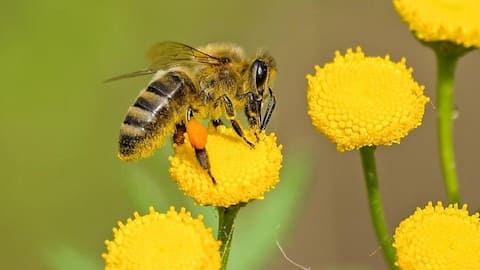Study reveals that bumblebees can survive underwater for a week
What's the story
Researchers at the University of Guelph in Canada made a startling discovery: certain bumblebees can survive underwater for up to a week This revelation occurred when hibernating queen common eastern bumblebees were accidentally submerged during a study and later recovered alive. Published in the journal Biology Letters, this revelation surprised Nigel Raine, a professor in the School of Environmental Sciences, who told CNN, "These are terrestrial organisms; they're not designed to be underwater."
Further testing
Bumblebees' survival rates unaffected by submersion
Following the initial accidental discovery, Raine and his team conducted a test with 143 queen common eastern bumblebees. The results revealed that bees submerged for up to 7 days had survival rates similar to those that remained dry. "We found very little impact of any of the submersion regimes," Raine told CNN. This research marks the first time scientists have studied how queen bumblebees fare when submerged for extended periods, providing new insights into their adaptability and resilience against flooding.
Survival mechanism
Bumblebees' hibernation habits and flooding resilience
Queen bumblebees typically hibernate during the colder months after male and worker bees die at the end of autumn. Their hibernating spots are typically located in well-drained soil on the banks. It was believed that these conditions protected them from fatal flooding. However, Raine's research indicates that common eastern bumblebees can withstand being underwater for at least a week. "These bees are effectively on energy-saver mode," Raine noted, suggesting they likely wouldn't survive underwater if they were active.
Future research
Unraveling the mystery of bumblebees' underwater survival
The study did not explore how these bees manage to survive underwater. One theory suggests they enter diapause - "a state of suspended growth and reproduction characterized by reduced oxygen intake," according to the university's statement. During diapause, respiratory openings called spiracles can close for extended periods, preventing water from entering their bodies. Raine intends to study if hibernating queen bees can survive underwater for over a week and if other bee species share this resilience.
Effective pollinators
About 1/3 of our food supply depends on bumblebees
Unlike honeybees, which form large colonies, bumblebees usually live in smaller groups with just a single queen and a few workers. Bumblebees are also highly effective pollinators. As they move from one flower to another, they're not just gathering nectar; their fuzzy bodies also transfer pollen grains, facilitating the fertilization of plants. This process, known as pollination, is crucial for plant diversity and health. Remarkably, about a third of our food supply depends on pollinators like bumblebees.
